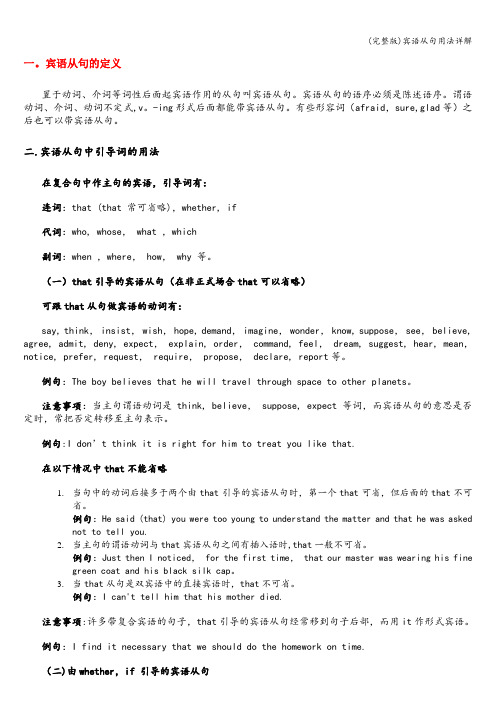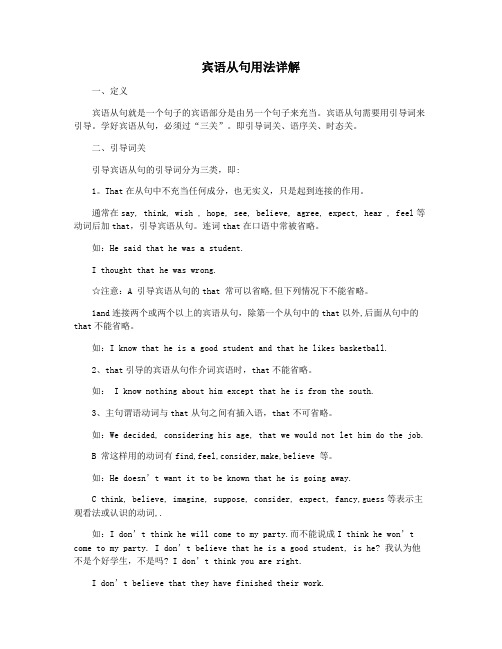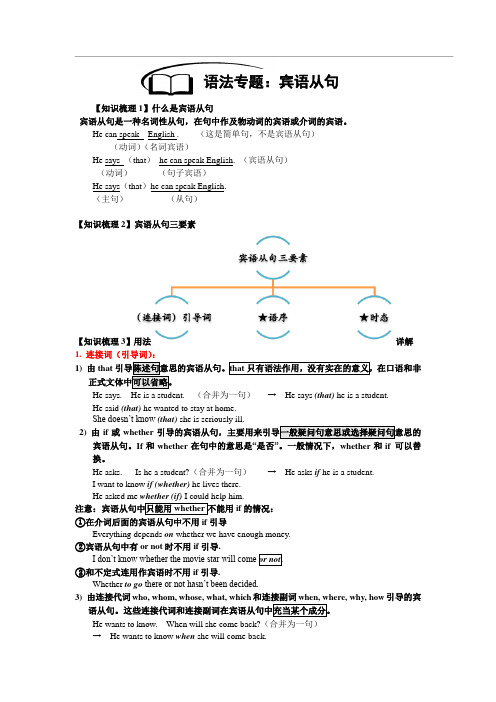英语宾语从句用法详解
(完整版)宾语从句用法详解

一。
宾语从句的定义置于动词、介词等词性后面起宾语作用的从句叫宾语从句。
宾语从句的语序必须是陈述语序。
谓语动词、介词、动词不定式,v。
-ing形式后面都能带宾语从句。
有些形容词(afraid,sure,glad等)之后也可以带宾语从句。
二.宾语从句中引导词的用法在复合句中作主句的宾语,引导词有:连词:that (that 常可省略),whether, if代词:who, whose, what ,which副词:when ,where, how, why 等。
(一)that引导的宾语从句(在非正式场合that可以省略)可跟that从句做宾语的动词有:say, think, insist, wish, hope, demand, imagine, wonder, know, suppose, see, believe, agree, admit, deny, expect, explain, order, command, feel, dream, suggest, hear, mean,notice, prefer, request, require, propose, declare, report等。
例句:The boy believes that he will travel through space to other planets。
注意事项:当主句谓语动词是 think, believe, suppose, expect 等词,而宾语从句的意思是否定时,常把否定转移至主句表示。
例句:I don’t think it is right for him to treat you like that.在以下情况中that不能省略1.当句中的动词后接多于两个由that引导的宾语从句时,第一个that可省,但后面的that不可省。
例句:He said (that) you were too young to understand the matter and that he was askednot to tell you.2.当主句的谓语动词与that宾语从句之间有插入语时,that一般不可省。
英语语法中宾语从句的用法详解

英语语法中宾语从句的用法详解宾语从句是英语学习中的常用语法,涉及到时态的转换,下面我们来详解一下宾语从句。
1、主句是一般现在时,从句根据实际情况使用任何时态。
例句:She says (that) she works from Monday to Friday.她说她从周一至周五上班。
(从句是一般现在时)She says (that) she will leave a message on his desk.她说她要在他桌子上留个便条。
(从句是一般将来时)2、主句是过去时态,从句须用过去时态的某种形式。
例句:He said there were no classes yesterday afternoon.他说昨天下午没有课。
(从句是一般过去时)He said (that) he was going to take care of the baby.他说他会去照看这个婴儿。
(从句是过去将来时)3、当宾语从句表示的是一个客观真理或者事实时,即使主句是过去时,从句也用一般现在时态。
例句:The teacher told us(that) nothing is difficult if we put our hearts into it.老师告诉我们世上无难事,只怕有心人。
She said(that) her father is twenty-eight years older thanher.她说她父亲比她大二十八岁。
He said that light travels much faster than sound.他说光比声音传播得快。
注意:当主句的谓语动词是think或believe,宾语从句要表达否定时,要把从句的否定转移到主句上。
I don't think he is going to help you with your English.我认为他不会帮你学英语的,这句话不可以翻译成:I think he isn't going to help you with your English.如果宾语从句有它的补语时,宾语从句用it代替,从句后置。
宾语从句及感叹句

宾语从句宾语从句用法详解置于动词、介词等词性后面起宾语作用的从句叫宾语从句。
宾语从句的语序必须是陈述语序。
谓语动词、介词、动词不定式,v.-ing形式后面都能带宾语从句。
有些形容词(afraid,sure,glad等)之后也可以带宾语从句。
二.宾语从句中引导词的用法在复合句中作主句的宾语,引导词有:连词:that (that 常可省略),whethe r, if代词:who, whose, what ,which副词:when ,where, how, why 等。
五. that引导的宾语从句(在非正式场合t hat可以省略)可跟that从句做宾语的动词有:say, think, insist, wish, hope, demand, imagin e, wonder, know, suppos e, see, believ e, agree, admit,deny, expect, explai n, order, comman d, feel, dream,sugge s t, hear, mean, notice, prefer, reques t, requir e, propos e, declar e, report等。
例句:The boy believ es that he will travel throug h spaceto otherplanet s.注意事项:当主句谓语动词是 think, believ e, suppos e, expect等词,而宾语从句的意思是否定时,常把否定转移至主句表示。
例句:I don‘t thinkit is rightfor him to treatyou like that.在以下情况中t hat不能省略1.当句中的动词后接多于两个由tha t引导的宾语从句时,第一个tha t可省,但后面的th at不可省。
英语宾语从句用法详解

英语宾语从句用法详解英语宾语从句是一个句子作为动词的宾语,一般由连词引导。
宾语从句可以出现在形容词、动词、名词的后面。
1. 形容词后面的宾语从句:形容词常用于某些短语动词后面,如believe, think, know, feel, understand, doubt等。
例如:- I believe that he is right.- She knows what she wants.- I doubt if they will come.- Do you understand what I'm saying?2. 动词后面的宾语从句:动词后面的宾语从句可以是及物动词或短语动词的宾语。
例如:- She said that she was tired.- He asked if I wanted anything to eat.- They want to know where we are going.- We saw that they were arguing.根据从句的内容和从句所在的动词,宾语从句可以有以下几种类型:- 陈述句型:that引导的从句,表示陈述或描述。
例如:She said that she would come.- 一般疑问句型:由疑问词引导的从句,以完整疑问句的形式出现。
例如:He asked me where I lived.- 特殊疑问句型:由疑问词引导的从句,以特殊疑问句的形式出现。
例如:Do you know what time it is?- 否定句型:由“whether...or not”或“if...not”引导的从句。
例如:I don't know whether he will come or not.3. 名词后面的宾语从句:名词后面的宾语从句通常由that引导,也可以使用其他连词引导,如whether, if, when, where等。
宾语从句用法详解(精编)

宾语从句用法详解一、宾语从句的定义比较:We know him. (简单句)主语S 谓语V 宾语OWe know that he likes English. (复合句)主语S 谓语V 主语S 谓语V 宾语S置于动词、介词等词性后面起宾语作用的从句叫宾语从句。
宾语从句的语序必须是陈述语序。
谓语动词、介词、动词不定式,v.-ing形式后面都能带宾语从句。
有些形容词(afraid,sure,glad等)之后也可以带宾语从句。
二.宾语从句中引导词的用法在复合句中作主句的宾语,引导词有:连词:that (that 常可省略),whether, if代词:who, whose, what ,which副词:when ,where, how, why 等。
(一)that引导的宾语从句(在非正式场合that可以省略)可跟that从句做宾语的动词有:say, think, insist, wish, hope, demand, imagine, wonder, know, suppose, see, believe, agree, admit, deny, expect, explain, order, command, feel, dream, suggest, hear, mean, notice, prefer, request, require, propose, declare, report等。
例句:The boy believes that he will travel through space to other planets.注意:A、否定前移:当主句谓语动词是think, believe, suppose, expect 等词,而宾语从句的意思是否定时,常把否定转移至主句表示。
例句:I don’t think it is right for him to treat you like that.B、在以下情况中that不能省略1、当句中的动词后接多于两个由that引导的宾语从句时,第一个that可省,但后面的that不可省。
宾语从句用法详解

宾语从句用法详解一、定义宾语从句就是一个句子的宾语部分是由另一个句子来充当。
宾语从句需要用引导词来引导。
学好宾语从句,必须过“三关”。
即引导词关、语序关、时态关。
二、引导词关引导宾语从句的引导词分为三类,即:1。
That在从句中不充当任何成分,也无实义,只是起到连接的作用。
通常在say, think, wish , hope, see, believe, agree, expect, hear , feel等动词后加that,引导宾语从句。
连词that在口语中常被省略。
如:He said that he was a student.I thought that he was wrong.☆注意:A 引导宾语从句的that 常可以省略,但下列情况下不能省略。
1and连接两个或两个以上的宾语从句,除第一个从句中的that以外,后面从句中的that不能省略。
如:I know that he is a good student and that he likes basketball.2、that引导的宾语从句作介词宾语时,that不能省略。
如: I know nothing about him except that he is from the south.3、主句谓语动词与that从句之间有插入语,that不可省略。
如:We decided, considering his age, that we would not let him do the job.B 常这样用的动词有find,feel,consider,make,believe 等。
如:He doesn’t want it to be known that he is going away.C think, believe, imagine, suppose, consider, expect, fancy,guess等表示主观看法或认识的动词,.如:I don’t thin k he will come to my party.而不能说成I think he won’t come to my party. I don’t believe that he is a good student, is he? 我认为他不是个好学生,不是吗? I don’t think you are right.I don’t believe that they have finished their work.比较:she believes that I am not a good student.2常可以互换。
2022年中考英语宾语从句讲解和练习

语法专题:宾语从句【知识梳理1】什么是宾语从句宾语从句是一种名词性从句,在句中作及物动词的宾语或介词的宾语。
He can speak English . (这是简单句,不是宾语从句)(动词)(名词宾语)He says (that)he can speak English. (宾语从句)(动词)(句子宾语)He says(that)he can speak English.(主句)(从句)【知识梳理2】宾语从句三要素【知识梳理3】用法详解1. 连接词(引导词):1) 由that引导陈述句意思的宾语从句。
that只有语法作用,没有实在的意义,在口语和非正式文体中可以省略。
He says. He is a student. (合并为一句)→He says (that) he is a student.He said (that) he wanted to stay at home.She doesn’t know (that) she is seriously ill.2) 由if或whether引导的宾语从句,主要用来引导一般疑问句意思或选择疑问句意思的宾语从句。
If和whether在句中的意思是“是否”。
一般情况下,whether和if 可以替换。
He asks. Is he a student?(合并为一句)→He asks if he is a student.I want to know if (whether) he lives there.He asked me whether (if) I could help him.注意:宾语从句中只能用whether不能用if的情况:①在介词后面的宾语从句中不用if引导Everything depends on whether we have enough money.②宾语从句中有or not时不用if引导.I don’t know whether the movie star will come or not.③和不定式连用作宾语时不用if引导.Whether to go there or not hasn’t been decided.3) 由连接代词who, whom, whose, what, which和连接副词when, where, why, how引导的宾语从句。
(完整版)宾语从句用法详解

宾语从句用法及其例句宾语从句,是名词性从句的一种。
在主从复合句中充当宾语,位于及物动词、介词或复合谓语之后的从句称为宾语从句。
宾语从句分为三类:动词的宾语从句,介词的宾语从句和形容词的宾语从句。
宾语从句用法时态:1.主句用一般现在时,从句可用任意时态。
2.主句用过去时,从句用过去某个时态。
3.主句用过去时,从句是客观真理时,只用一般现在时。
一、宾语从句的连接词(1)从属连词连接宾语从句的从属连词主要有that,if,whether.that引导表示陈述句的宾语从句,if和whether引导表示“是否”的一般疑问句的宾语从句.He told me (that he would) go to the college the next year他告诉我他明年上大学.I don’t know if there will be a bus any more.我不知道是否还会有公交车.Nobody knew whether he could pass the exam.没人知道他是否会通过考试.(2)连接代词连接代词主要有who, whom ,whose ,what ,whoever ,whomever ,whosever, whatever, whichever等.连接代词一般指疑问,但what, whatever除了指疑问外,也可以指陈述.Do you know who has won Red Alert game?你知道是谁赢得了红色警报的游戏?The book will show you what the best CEOs should know.这本书会告诉你最好的执行总裁该了解些什么.Have you determined whichever you should buy,a Motorola or Nokiacell phone?你决定好是买诺基亚还是摩托罗拉的电话了吗?(3)连接副词连接副词主要有when,where,why,how,whenever,wherever,however等.He didn’t tell me when we should meet again.他没有告诉我什么时候我们能再见面.Could you please tell me how you use the new panel?你能告诉我怎么用这个新的操作盘吗?None of us knows where these new parts can be bought.没有人知道这些的新的零件能在哪里买到.动宾重点,介宾掌握,形宾了解二、动词的宾语从句(1)大多数动词都可以带宾语从句We all expect that they will win , for members of their team are stronger.我们都预料他们会赢,因为他们的队员更强壮.He told us that they would help us through the whole work.他告诉我们在整个工作中,他们都会帮忙的.(2)部分“动词+副词”结构也可以带宾语从句I have found out that all the tickets for the concert have been sold out.我发现这场音乐会的所有票都卖光了.Can you work out how much we will spend during the trip?你能计算出这次旅行我们将花费多少钱吗?(3)动词短语也可以带宾语从句常见的这些词有:make sure确保make up one’s mind下决心keep in mind牢记Make sure that there are no mistakes in your papers before youturn them in.在上交试卷前确保没有任何错误.可运用形式宾语it代替的宾语从句①动词find,feel,consider,make,believe等后面有宾语补足语的时候,则需要用it 做形式宾语而将that宾语从句后置.I think it necessary that we take plenty of hot water every day .我认为每天多喝开水是有必要的.I feel it a pity that I haven’t been to the get-together.我没去聚会,感觉非常遗憾.I have made it a rule that I keep diaries.我每天写日记成了习惯.We all find it important that we (should) make a quick decisionabout this mater.我们都认为对这件事马上做出决定很重要.②有些动词带宾语从句时需要在宾语与从句前加it这类动词主要有:hate, take , owe, have, see to.I hate it when they with their mouths full of food.我讨厌他们满嘴食物时说话.He will have it that our plan is really practical.他会认为我们的计划确实可行.We take it that you will agree with us.我们认为你会同意我们的.When you start the engine, you must see to it that car is inneutral.开启发动机时, 一定要使汽车的离合器处于空挡位置.③若宾语从句是wh-类,则不可用it代替We all consider what you said to be unbelievable.我们都认为你所说的是不可信的.We discovered what we had learned to be valuable.我们发现我们所学到的东西都是有用的.三、介词的宾语从句(1)用wh-类的介词宾语从句We are talking about whether we admit students into our club.我们正在讨论是否让学生加入我们的俱乐部.The new book is about how Shenzhou 6 manned spaceship wassent up into space.这本新书是关于神州6号载人航天飞船是如何升入太空的.(2)用that,if引导的介词宾语从句有时候except,but,besides三个介词后可见到that引导的宾语从句I know nothing about my new neighbor except that he used towork with a company.对于我的新邻居我只知道他曾在一家公司上班,其他一无所知.四、形容词的宾语从句有些形容词具有动词的含义,所以也可以带一个宾语从句,常用来引导宾语从句的形容词有: sure,certain,glad,please,happy,sorry,afraid,satisfied,surprisedI am sure I will pass the exam.我确信我会通过考试.I am sorry that I have troubled you so long.很抱歉我这么长时间在打扰你.He is glad that Li Ming went to see him when he was ill.他很高兴在他生病的时候李明能去看望他.五、if,whether在宾语从句中的区别①if和whether在作“是否”解时,引导宾语从句常放在动词know,ask,care,wond er,find out等之后,介词后一般不用if②少数动词,如:leave,put,discuss,doubt后的宾语从句常用whether.③whether后可以加or not,但是if不可以.④在不定式前只能用whether.(如:I can’t decide whether to stay. 我不能决定是否留下。
- 1、下载文档前请自行甄别文档内容的完整性,平台不提供额外的编辑、内容补充、找答案等附加服务。
- 2、"仅部分预览"的文档,不可在线预览部分如存在完整性等问题,可反馈申请退款(可完整预览的文档不适用该条件!)。
- 3、如文档侵犯您的权益,请联系客服反馈,我们会尽快为您处理(人工客服工作时间:9:00-18:30)。
英语宾语从句用法详解初中英语分类练习——宾语从句复习目标:1、掌握引导宾语从句的各种连词2、掌握宾语从句的语序——主句+连接词+主语+谓语3、掌握宾语从句,主句与从句在时态上的呼应。
重点:语序和时态呼应难点:语序和时态呼应;疑问词+不定式的转化;状语从句的辨析一、宾语从句的连接词:1、连词that,只起连接作用,在从句中不作句子成分,也无词汇意义,在口语中常被省略。
eg. He knew (that) he should work hard.2、连词if、whether,它们起连接作用,在从句中不作句子成分,作“是否”解,在口语中多用if。
eg. Tom don’t know if/whether his grandpa liked the present. He asked me whether or not I was coming. 一般情况下,if和whether可以互换,但以下3种情况只能用whether:①在不定式前:Whether to go there or not hasn’t been decided.②在介词前:It depends on(依靠) whether it is going to rain. ③与or not 连用:They are talking about whether to go there or not. 3、连接代词who, whom, whose, what, which,连接副词when, where, why, how,它们起连接作用,作句子成分,各有自己的意义。
eg. The teacher asked the new studentswhichclass he was in. I wonderwherehe got so much money. 【注意】1、由连接代、副词引导的宾语从句可以和“疑问词+不定式”结构转化。
eg. I don’t know how I should do with the presents.èI don’t know how to do with the presents. 2、要注意区分判断由if、when引导的从句类型. 二、宾语从句的语序:宾语从句的语序是陈述语序,即“连接词+主语+谓语+其它成分”。
特别强调:它的主语和谓语的语序是陈述语序,而不是疑问句的倒装结构。
Can you tell mewho(m) do we have to see(╳) Can you tell me who(m) we have to see(√) The teacher asked the studentswhat they were doing.(思考: what在从句中的成分) 陈述句变为宾语从句时,要注意人称和时态的变化,语序不变。
eg. She said, “I will leave a message on the desk.”àShe said she would leave a message on the desk. 一般疑问句和特殊疑问句变为宾语从句时,也要注意人称和时态的变化,后面接陈述语序。
Eg. “Where are the tickets” I asked him.àI asked him where the tickets are. 三、宾语从句的时态呼应:宾语从句中谓语动词的时态,常常受到主句谓语时态的制约,此为时态呼应。
如果主句谓语是一般现在时或将来时,从句谓语的时态不受限制;如果主句谓语的时态是一般过去时,从句一般要随着改为相应的过去时态(一般过去时、过去进行时、过去将来时、过去完成时)。
eg. I thought (that) you are free today. (╳) I thought (that) youwould befree today. (√) 【注意】当宾语从句叙述的是客观真理时,不管主句谓语的时态如何,从句都用一般现在时。
eg. The teacher told us (that) the earthmovesaround the sun. 四、其他需要说明的问题: 1、标点由主句决定,如主句是陈述句、祈使句,则用句号;是疑问句则用问号。
eg.I heard she had been to the Great Wall.Can you tell me which bus I should take 2、要注意个别句子中主从句人称的一致。
五、宾语从句和状语从句的区分: eg. 1) I will go out tomorrowif it is fine. 2) I don’t knowif the train has arrived. 句1中if引导的是状语从句。
这个从句表示“条件”,修饰主句。
整个句子的意思是如果明天天气好,我就出去。
句2中if引导的是宾语从句,充当谓语动词don’t know的宾语。
整个句子的意思是我不知道火车是否到达。
判断方法: 1、可以从整个句式看。
状语从句一般可以放在主句的前面或后面(个别除外),宾语从句只能放在主句谓语动词之后。
2、从引导词看。
if充当宾语从句的连接词时,相当于whether,词义为“是否”,充当状语从句的连接词时,词义为“如果”。
when 充当宾语从句的连接词时,意为“什么时候”,充当状语从句的连接词时,意为“当……的时候”。
3、从时态看。
if和when作连接词时,引导宾语从句要注意:从句的谓语动词的时态应根据主句的时态作相应的变化。
if和when充当从属连词时,引导条件和时间状语从句,若主句的谓语动词用一般将来时,则从句的时态应用一般现在时表示将来。
实战演练一、例题选讲例1 I don’t know ________ he will come or not. A. how B. whether C. weather D. when 答案: B 提示:在宾语从句中出现了or not,这里只能用whether。
第二题答案为B,根据题意问他们何时回来,所以要用when。
例2 Can you tell me ________they will come back A. where B. when C. which D. who 答案: B 提示:根据题意问他们何时回来,所以要用when。
例3 Have you seen the doctor He asked me.(两句并一句)答案: He asked me if / whether I had seen a doctor 提示:是一般疑问句,连接词应为if / whether 例4 How can we get to the science museum Could you tell us(两句并一句)答案: Could you tell me how we can get to the science museum 提示:特殊疑问句,连接词就是它本身的特殊疑问词how,将情态动词can放在主语me之后,时态运用取决于主句。
主句could you tell me是委婉语气,是一般现在时,所以从句是什么时态就用什么时态。
直接引语变间接引语一、如何变人称:直接引语变间接引语时,如果从句中的主语是第一人称或被第一人称所修饰。
从句中的人称要按照主句中主语的人称变化如: She said. "My brother wants to go with me. "→She said her brother wanted to go with her. “直接引语变间接引语时,若从句中的主语及宾语是第二人称。
或被第二人你所修饰。
从句中的人称要跟引号外的主句的宾语一致。
如果引号外的主句没有宾语。
也可以用第一人称,如: He said to Kate. "How is your sister now"→He asked Kate how her sister was then。
“直接引语变间接引语时。
如果从句中的主语及宾语是第三人称或被第三人称所修饰从句中的人称一般不需要变化如: Mr Smith said。
"Jack is a good worker。
"→Mr Smith said Jack was a good worker。
二、如何变时态:直接引语在改为间接引语时、时态需要做相应的调整。
如果主句谓语动词为现在范畴的时态或一般将来时,则间接引语中的动词仍保持直接引语原来时态。
如果主句谓语动词为过去时,间接引语中的动词时态按下列变化:(1)一般现在时变为一般过去时(2)现在进行时变为过去进行时(3)一般将来时变为过去将来时(4)现在完成时变为过去完成时(5)一般过去时变为过去完成时(6)过去完成时不变,仍为过去完成时要注意在以下几种情况:(1)如果直接引语是表示客观真理时,变为间接引语,一般现在时不改为一般过去时。
如: The teacher said "The earth goes round the sun." →The teacher said that the earth goes round the sun. (2)直接引语中有具体的过去某年、某月、某日作状语,变为间接引语时,时态不变。
如: He said to me, "I was born in 1973." →He told me that he was born in 1973. (3)如果直接引语所述事实在当时和目前同样生效,变为间接宾语时,一般现在时不改为一般过去时。
如: He said, "I'm a boy, not a girl." →He said that he is a boy ,not a girl. (4)直接引语如果是一般现在时。
表示一种反复出现或习惯性的动作,变间接引语时,时态不变。
如: The girl said, "I get up at six every morning." →The girl said that she gets up at six every morning. (5)如果直接引语中含有since, when, while引导的表示过去时间的状语从句,在变为间接引语时,只改变主句中的谓语动词,从句的一般过去时则不变。
如: He said to me, "I have taught English since he came here ." →He told me that he had taught English since he came here. (6)如果直接引语中含有情态动词must, need, had better以及情态动词的过去式could, might, should, would,在变为间接引语时,这些情态动词没有时态的改变。
